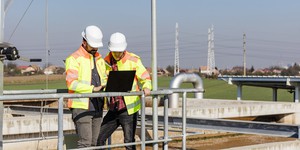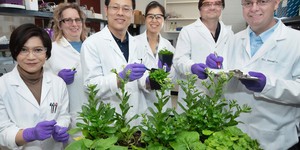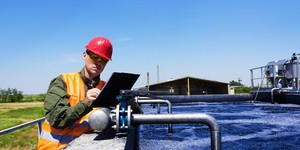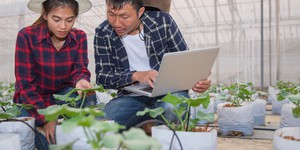Log In
Summary
Areas of Science
Difficulty
Time Required
Average (6-10 days)
Material Availability
Readily available
Cost
Average ($50 - $100)
Credits
Theresa J. Hannig
*Note:
For this science project you will need to develop your own experimental procedure. Use the information in the summary tab as a starting place. If you would like to discuss your ideas or need help troubleshooting, use the Ask An Expert forum. Our Experts won't do the work for you, but they will make suggestions and offer guidance if you come to them with specific questions.
If you want a Project Idea with full instructions, please pick one without an asterisk (*) at the end of the title.
If you want a Project Idea with full instructions, please pick one without an asterisk (*) at the end of the title.
Abstract
Reclaimed (treated) wastewater can be used for many purposes, including landscape watering and freeing up valuable fresh water for other purposes (like drinking water). It's a great way to conserve water, but is it really safe? This science fair project is designed to find out.Objective
The objective of this science fair project is to investigate if watering with recycled water affects the safety of school lawns.Experimental Procedure
Before starting this science fair project, you'll need to read about, water quality, water testing, growing grass, and how water is recycled. Once you're familiar with these topics, start your science fair project by growing three patches of lawn in three separate miniature greenhouses. You'll have to decide how to create your greenhouses; one way is to make them out of plastic boxes, chicken wire, and clear plastic trash bags. Water one lawn patch with recycled water, one with distilled water, and the third with tap water. Measure the growth rates of each grass patch and compare their general appearances. Read the guide on Measuring Plant Growth for more ideas on how to evaluate the three lawns. Collect water runoff samples, and using one or more water quality testing kits, test each for pathogens, nutrients, and other characteristics. Water-quality testing kits can be purchased from a variety of science supply stores. See the Approved Supplier Program page for a list of potential vendors.
Ask an Expert
Do you have specific questions about your science project? Our team of volunteer scientists can help. Our Experts won't do the work for you, but they will make suggestions, offer guidance, and help you troubleshoot.
Global Connections
The United Nations Sustainable Development Goals (UNSDGs) are a blueprint to achieve a better and more sustainable future for all.
This project explores topics key to Clean Water and Sanitation: Ensure access to water and sanitation for all.
This project explores topics key to Responsible Consumption and Production: Ensure sustainable consumption and production patterns.
Careers
If you like this project, you might enjoy exploring these related careers:
Career Profile
When you think about a city that is a great place to live, what do you consider? Probably a community where the citizens are happy, healthy, and comfortable. Part of being all three is having a clean, safe, and constant water supply. Many of us take for granted that when we turn the faucet on we will be able to get a glass of water or that when we flush the toilet our waste will be carried away and treated somewhere. Well, that is what a water or wastewater engineer does. Their job is to design…
Read more
Career Profile
With a growing world population, making sure that there is enough food for everyone is critical. Plant scientists work to ensure that agricultural practices result in an abundance of nutritious food in a sustainable and environmentally friendly manner.
Read more
Career Profile
Have you ever wondered what happens to that soapy water from your kitchen sink or laundry room washer, or the waste water from your bathroom? What about the water that factories discharge after making products? Or the water that runs off of roads and farmlands after a big storm? Water and liquid waste treatment plant and system operators run the amazing water treatment plants that remove pollutants and other harmful materials from waste water, so that it can be safely returned to the…
Read more
Career Profile
Soil and water are two of Earth's most important natural resources. Earth would not be able to sustain life without nutritive soil to grow food and clean water to drink. Soil and water conservationists foster the science and art of natural resource conservation. The scientists work to discover, develop, implement, and constantly improve ways to use land that sustains its productive capacity, and enhances the environment at the same time. Soil and water conservationists are involved in improving…
Read more
Related Links
- Science Fair Project Guide
- Other Ideas Like This
- Environmental Engineering Project Ideas
- My Favorites
Cite This Page
General citation information is provided here. Be sure to check the formatting, including capitalization, for the method you are using and update your citation, as needed.MLA Style
Science Buddies Staff.
"From Your John to the School Lawn: Is Recycled Water Really Safe?" Science Buddies,
28 July 2017,
https://www.sciencebuddies.org/science-fair-projects/project-ideas/EnvEng_p002/environmental-engineering/greywater-for-plants?class=AQVJtdJXYV3ve6OkG5vxHnRPzADuy9_WH1roAmnvqk9ngrwWQoGB35P8P5RinMKtXJNwwndJclgEvt_JDKLcrTkds34-XFwZSO5haRngmb-brQ.
Accessed 19 Apr. 2024.
APA Style
Science Buddies Staff.
(2017, July 28).
From Your John to the School Lawn: Is Recycled Water Really Safe?
Retrieved from
https://www.sciencebuddies.org/science-fair-projects/project-ideas/EnvEng_p002/environmental-engineering/greywater-for-plants?class=AQVJtdJXYV3ve6OkG5vxHnRPzADuy9_WH1roAmnvqk9ngrwWQoGB35P8P5RinMKtXJNwwndJclgEvt_JDKLcrTkds34-XFwZSO5haRngmb-brQ
Last edit date: 2017-07-28
Explore Our Science Videos
Popsicle Stick Chain Reaction -STEM activity
Popsicle Stick Catapult
Crayon Rock Cycle












